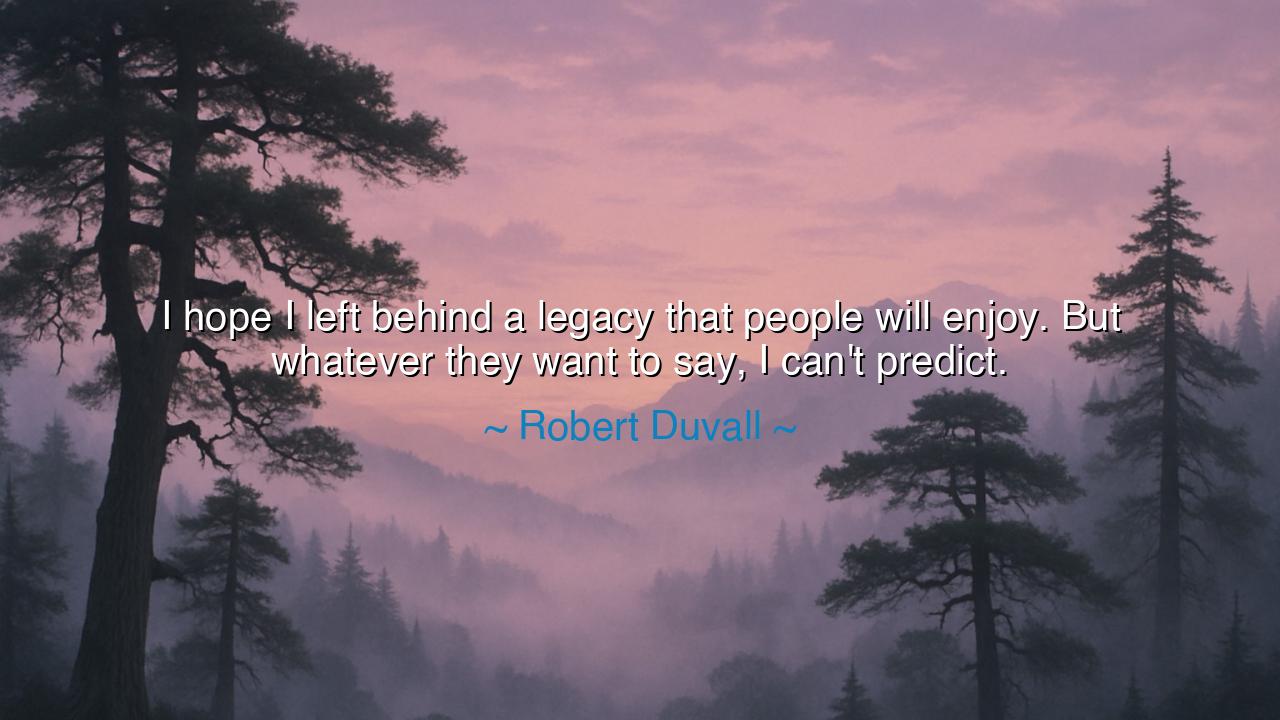
I hope I left behind a legacy that people will enjoy. But
I hope I left behind a legacy that people will enjoy. But whatever they want to say, I can't predict.






“I hope I left behind a legacy that people will enjoy. But whatever they want to say, I can’t predict.” — thus spoke Robert Duvall, the venerable actor whose voice and presence have echoed across generations of film. His words are not those of vanity or pride, but of humility and acceptance, spoken by a man who has walked through the fire of creation and emerged with the wisdom of one who understands that legacy is not something we command — it is something we leave, and others shape. Duvall’s reflection is a quiet meditation on art, mortality, and surrender — the understanding that though we may labor to build something meaningful, we cannot control how it will live on in the hearts of others.
In the spirit of the ancients, these words recall the timeless truth that no man owns his own remembrance. The poet may write, the warrior may fight, the king may build his monuments — yet it is the ages that will decide whether their works are cherished or forgotten. Duvall, standing in the twilight of a long and storied life, speaks as one who has offered his gifts to the world and now releases them into the hands of fate. His is not the false modesty of the untested, but the serene acceptance of one who knows that control ends where legacy begins. For once the work leaves the artist, it becomes the world’s, and the world will interpret it as it wills.
The ancients knew this well. Homer, who sang of Achilles and Odysseus, may never have imagined how his words would echo through millennia. Socrates, condemned by his city, did not live to see his name sanctified by philosophers and teachers yet unborn. Van Gogh, painting in loneliness and rejection, did not know that his canvases would one day adorn the walls of temples to beauty. These were men who acted from truth, not from the craving for immortality. Their legacy, like Duvall’s, was born not from prediction but from authentic devotion to the craft. They lived for the work itself — and that, perhaps, is why their memory endured.
In his quote, Duvall’s hope “that people will enjoy” what he has done carries within it a beautiful simplicity. It is not the yearning for fame, but the wish that one’s labor might bring joy, reflection, or meaning to another soul. That is the purest form of legacy — not the stone statue, not the loud proclamation, but the quiet thread of influence that passes unseen from heart to heart. And yet, his acknowledgment — “whatever they want to say, I can’t predict” — reveals the wisdom of detachment. He knows that once the work is done, the artist must release it, just as a parent must one day let go of the child they have raised. For legacy is not ownership; it is offering.
The world often forgets this lesson. Many strive to control their legacy, to script how they will be remembered. But such striving is folly, for memory is a living thing — it changes, it breathes, it belongs to those who come after. The wise man, like Duvall, does not demand remembrance; he earns it through sincerity. His task is to labor faithfully, to speak truth in his time, and then to let the winds of history decide what remains. For even if the world forgets his name, the spirit of his work — the honesty, the courage, the beauty — will ripple invisibly through those he has touched.
Consider the example of Marcus Aurelius, the philosopher-emperor of Rome. In his journals, later called Meditations, he wrote not for glory but for self-discipline. He never meant for the world to read his words — yet centuries later, his private reflections guide millions. Had he tried to predict his legacy, he would have failed; yet by living truthfully, he became immortal. So too with Duvall, and with any person who seeks to create something lasting: the path to remembrance is not to chase it, but to serve one’s craft with integrity.
Therefore, O seeker of meaning, learn from this wisdom: do not write your own epitaph before your time. Do your work with honesty, love, and patience. Let your actions, not your anxieties, speak for you. Give your gifts to the world freely, and then let them go. You cannot predict how the world will remember you, nor should you try. For the beauty of legacy lies in its mystery — it is not a mirror we hold to ourselves, but a reflection that others discover long after we are gone. As Robert Duvall reminds us, live your life as an offering, and let the ages decide the rest. In the end, that surrender — that faith in the power of one’s truth — is the most noble legacy of all.






AAdministratorAdministrator
Welcome, honored guests. Please leave a comment, we will respond soon